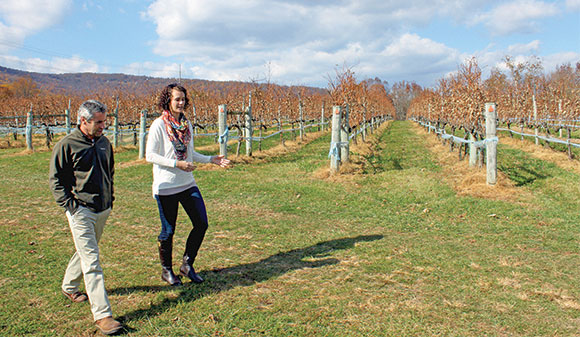FEATURE

The wine industry in the eastern U.S. is poised to become a world-class producer of notable wines, but the climb hasn't been an easy one. The climate of the mid-Atlantic states is almost always too wet, too unpredictable, and too frost-prone for many of the more delicate grape cultivars (a grape variety resulting from selective breeding). On the East Coast, success depends on the experience and audacity of growers who must balance a host of viticultural and climatological factors with tight harvest and bottling schedules, as well as the variable expectations of consumers.
Unlike wine regions in France and California, which have been in production for centuries, the eastern U.S. offers interactions among geography, geology, climate, and vine genetics that growers still are teasing out. The knowledge of these interactions, known as terroir, is extremely important to the success of a vineyard. Through understanding terroir, vintners can select the types of grapes and rootstocks that will grow best in that precise location. Historically, this knowledge was accumulated through generations of trial and error, but in the eastern U.S., the East Coast Viticulture Suitability tool (ECVS) is giving wineries an advantage.
The tool was developed by Virginia Tech's Center for Geospatial Information Technology under the leadership of director Peter Sforza and project manager Erica Adams (environmental policy and planning '09, M.S. geography '11). The team collaborated with commercial growers and viticulturists from Virginia Tech, Cornell, Ohio State, North Carolina State, and the University of Maryland to develop the tool as part of a project funded by the U.S. Department of Agriculture's (USDA) National Institute of Food and Agriculture specialty crops research initiative.
ECVS allows growers to select a potential site and then use the tool to merge the best available climate, soil, and topography data from the USDA, the National Oceanic and Atmospheric Administration, the U.S. Geological Survey, and NASA to produce a complete assessment of the site. The ability to evaluate suitability and match a cultivar to a specific location is the cornerstone of a high-quality vintage.
"The ECVS tool shows how geospatial technology can take multiple layers of complex information and use them to place answers directly in the hands of people in the field," said Adams, a geospatial analyst.
Tom Kelly, the vineyard manager of Rappahannock Cellars in Huntly, Va., and president of the Virginia Vineyards Association, understands the complexities of viticulture better than most. "Everything starts in the vineyard. You can make bad wine from good grapes, but you will never make good wine from bad grapes."
To grow good grapes and make good wine, one must know as much as possible about the environment the grapes are rooted in. Kelly uses ECVS to evaluate grapes brought in under contract from other vineyards. He can effectively evaluate growing conditions even at vineyards he has never visited, helping to identify crops with the potential to balance the character of grapes harvested at Rappahannock Cellars. More importantly, he can rule out grapes grown in unfavorable conditions. "I have seen growers who have planted the very worst varieties for their soil types. ... A few mistakes like that can turn someone's dream of owning a vineyard into a nightmare," Kelly said. "The tool is helping these growers to understand their land better and make fewer of these costly mistakes. Every successful vineyard in the mid-Atlantic helps the whole industry."
Brent Sams (M.S. geography '12) is a research viticulturist with E. & J. Gallo Winery in Modesto, Calif. "Unlike in California, where the biggest concern is negotiating water rights, growers in the East face a completely different set of challenges," he said. Regarding the ECVS tool, he added, "Growers have really never had access to a tool that brings it all together. The tool multiplies and magnifies the services traditionally delivered by Extension agents and private vineyard consultants and puts the best information available into a user-friendly app for growers all over the mid-Atlantic."
As use of ECVS increases across the region, patterns in varietal selections will emerge that will help the East Coast develop its terroir and lay claim to its own niche in the global market.